新视野大学英语第三电子教案book 3 unit
新视野大学英语读写3(第三版)优秀教案

新视野大学英语读写教程(第三版)BOOK 3 教案章节 Unit One: The Way to SuccessSection A: New Words and Expressions 教案内容T ext: Never, ever give up! Exercises: Vocabulary, Sentence Structure, Translation Listening, Speaking & Writing Skills1.To talk about the secret of succes 。
s教案目的2. To further understand the tex 。
t3. To apply the phrases and pattern 。
s4. To master the essay writing skill。
1. Clearly know the structure of the passag 。
e教案要求2. Master the important language point 。
s3. Briefly summarize the passage alon 。
e4. Correctly use and master the key words in this unit.1. The structure of the whole passagediscussedand the writing ways重点m entioned in this passage2. The reading skills mentioned in this unit3. listening practicing related to the contents learned in this unit 1. The use of the new words and phrases in this passage难点2. The writing ways mentioned in this passage3. Some important sentence structures课堂设 计The First TwoPeriodsStep 1: Lead-in 10mStep 2:Pre-readingActivities 10mStep 3: NewWords80mQ uestioning & Discussing Questioning &DiscussingLecturing,Questioning &Questioning &DiscussingLecturing,Questioning&Dis Lec Que & Giv ExaThe Second Step 1:BackgroundInformation10mQ uestioning &DiscussingTwo Step 2: Structure Analysis 10m LecturingPeriodsStep 3: Language points and Difficult Sentences 70mLecturing,Questioning &Giving Examples2 / 45Step 4: Comprehension of the Text A 10m Q uestioning & DiscussingThe Third Two Periods Step 1: Summarize the passage orally 20mStep 2: Exercises (Words in use, Wordbuilding, Banked cloze, Expressions in use,70mTranslation in Section A)Step 3: Revision & Homework 10mQ uestioning &DiscussingQuestioning &DiscussingLecturing,QuestioningStep 1: Check Homework 30m QuestioningThe Forth Step 2:Structured Writing 30mW atching &DiscussingTwo Periods Step 3: Listening 20mL istening &Questioning Step 4: Speaking 20mQ uestioning &Discussing 教学过程The First Two Periods:Step 1: Lead-in:1. What is success?2. What do you think are the secrets of success?Step 2: Pre-reading Activities:1. Listen to a talk about steps to make your dreams come true. Fill in the blanksbased on what you hear.2. Listen to the talk again and discuss the following questions.Step 3: New WordsThe Second Two Periods:Step 1: Background Information1. Public schools in the UK & US2. Winston ChurchillStep 2: Structure AnalysisPart I (Paras.1-2): By using Winston Churchill ’s story and his speech at Harrow as an introduction to the topic, the text makes clear its statement:the secret of success is “Never give up ”.Part II (Paras.3-7): Through the examples of world famous scientists, statesman, andjurist, the text brings forward the statement that only those with astrong will , those who “keep their eyes on the prize ”, and thosewho expend the substantial effort to keep going, will finally succeed.Part III (Paras 8): By reinforcing the statement given in part II, the text draws theconclusion that with hard work, determination, dedication andpreparation, you can transcend any handicap, accomplish any feat,and achieve success.Step 3: Language points and Difficult SentencesPractical Phrases1. deviate from ⋯偏离,背离⋯⋯2. preclude sb. from doing 阻止某⋯人做⋯⋯3. triumph over 战胜⋯⋯⋯4. in (the) pursuit of 追⋯求⋯⋯5. work one ’s。
新视野大学英语第三版电子教案Book3unit5
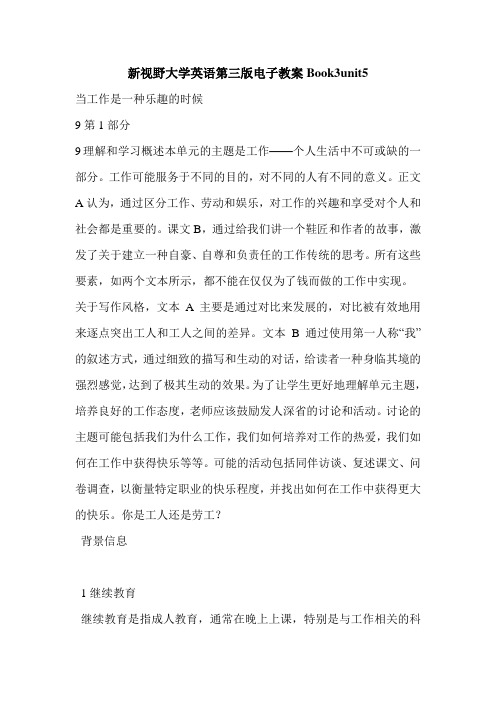
新视野大学英语第三版电子教案Book3unit5当工作是一种乐趣的时候9第1部分9理解和学习概述本单元的主题是工作——个人生活中不可或缺的一部分。
工作可能服务于不同的目的,对不同的人有不同的意义。
正文A认为,通过区分工作、劳动和娱乐,对工作的兴趣和享受对个人和社会都是重要的。
课文B,通过给我们讲一个鞋匠和作者的故事,激发了关于建立一种自豪、自尊和负责任的工作传统的思考。
所有这些要素,如两个文本所示,都不能在仅仅为了钱而做的工作中实现。
关于写作风格,文本A主要是通过对比来发展的,对比被有效地用来逐点突出工人和工人之间的差异。
文本B通过使用第一人称“我”的叙述方式,通过细致的描写和生动的对话,给读者一种身临其境的强烈感觉,达到了极其生动的效果。
为了让学生更好地理解单元主题,培养良好的工作态度,老师应该鼓励发人深省的讨论和活动。
讨论的主题可能包括我们为什么工作,我们如何培养对工作的热爱,我们如何在工作中获得快乐等等。
可能的活动包括同伴访谈、复述课文、问卷调查,以衡量特定职业的快乐程度,并找出如何在工作中获得更大的快乐。
你是工人还是劳工?背景信息1继续教育继续教育是指成人教育,通常在晚上上课,特别是与工作相关的科目。
2体验式学习体验式学习是从直接经验中创造意义的过程。
它是通过对做的反思来学习,这是由死记硬背来控制的。
19919体验式学习的例子是去动物园,通过观察和与动物园环境的互动来学习,而不是从书中阅读关于动物的内容。
因此,一个人用第一手知识进行发现和实验,而不是听或读别人的经历。
在一个严格意义上的奴隶制已经被废除的社会中,围绕工作的社会条件、工作的价值和工资,已经使许多劳动者沦为现代奴隶——“雇佣奴隶”。
(第106段)。
1)含义:在一个严格意义上已经结束奴隶制的社会里,工作的社会地位,工作的价值和工资,何说,中国政府将继续贯彻“一国两制”的方针。
监考老师警告学生不要在考试中作弊,以免他们侮辱自己。
注这里的“工资奴隶”是指那些仅仅为了赚取工资而工作的人。
新视野大学英语(第三版)读写教程Book3-Unit3-教案
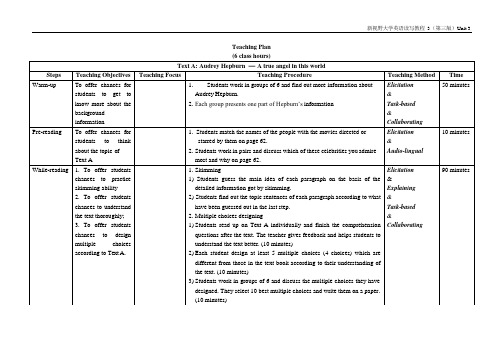
新视野大学英语读写教程 3(第三版)Unit 3
To offer students chances to conquer vocabulary obstacles in reading and learn to use some in writing
2. Language points: Vocabulary:
Pre-reading
1. Students match the names of the people with the movies directed or starred by them on page 62. 2. Students work in pairs and discuss which of these celebrities you admire most and why on page 62. 1. Skimming 1) Students guess the main idea of each paragraph on the basis of the detailed information got by skimming. 2) Students find out the topic sentences of each paragraph according to what have been guessed out in the last step. 2. Multiple choices designing 1) Students read up on Text A individually and finish the comprehension questions after the text. The teacher gives feedback and helps students to understand the text better. (10 minutes) 2) Each student design at least 5 multiple choices (4 choices) which are different from those in the text book according to their understanding of the text. (10 minutes) 3) Students work in groups of 6 and discuss the multiple choices they have designed. They select 10 best multiple choices and write them on a paper. (10 minutes)
新视野大学英语读写3(第三版)优秀教案
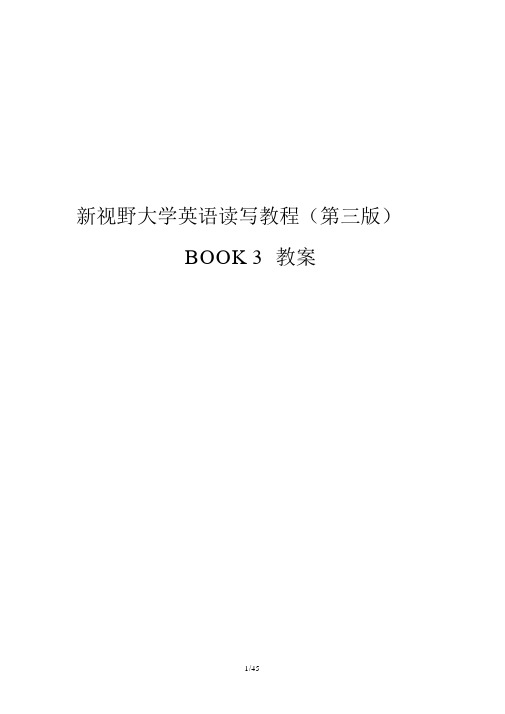
新视野大学英语读写教程(第三版)BOOK 3 教案章节Unit One: The Way to SuccessSection A: New Words and Expressions教案内容Text: Never, ever give up!Exercises: Vocabulary, Sentence Structure,Translation Listening, Speaking & Writing Skills教案目的1.To talk about the secret of success。
2. To further understand the text。
3.To apply the phrases and patterns。
4.To master the essay writing skill。
1. Clearly know the structure of the passage。
2. Master the important language points。
教案要求3.Briefly summarize the passage alone。
4.Correctly use and master the key words in this unit.重点难点1.The structure of the whole passagediscussed and the writing waysmentioned in this passage2.The reading skills mentioned in this unit3.listening practicing related to the contents learned in this unit1.The use of the new words and phrases in this passage2.The writing ways mentioned in this passage3.Some important sentence structures课堂设计Step 1: Lead-in10m Questioning&The Discussing Questioning&First Step 2: Pre-reading Activities10m DiscussingTwoLecturing,PeriodsStep 3: New Words80m Questioning&Giving Examples The Step 1: Background Information10m Questioning& Second DiscussingTwo Step 2: Structure Analysis10m LecturingPeriodsLecturing, Step 3: Language points and Difficult70m Questioning&SentencesGiving ExamplesStep 4: Comprehension of the Text A10m Questioning&DiscussingStep 1: Summarize the passage orally20m Questioning& DiscussingTheStep 2:Exercises (Words in use, WordThird Questioning& building,Banked cloze, Expressions in use,70mTwoTranslation in Section A)DiscussingPeriodsLecturing, Step 3: Revision & Homework10m QuestioningStep 1: Check Homework30m QuestioningTheStep 2:Structured Writing30m Watching &Forth DiscussingTwoStep 3: Listening20m Listening &Periods QuestioningStep 4: Speaking20m Questioning & Discussing教学过程The First Two Periods:Step 1: Lead-in:1.What is success?2.What do you think are the secrets of success?Step 2: Pre-reading Activities:1. Listen to a talk about steps to make your dreams come true. Fill in the blanksbased on what you hear.2. Listen to the talk again and discuss the following questions.Step 3: New WordsThe Second Two Periods:Step 1: Background Information1. Public schools in the UK & US2. Winston ChurchillStep 2: Structure AnalysisPart I (Paras.1-2): By using Winston Churchill’ s story and his speech at Harrow as anintroduction to the topic, the text makes clear its statement: thesecret of success is“ Never give up”.Part II (Paras.3-7): Through the examples of world famous scientists, statesman, andjurist, the text brings forward the statement that only those with astrong will , those who“ keep their eyes on the prize” , and those whoexpend the substantial effort to keep going, will finally succeed.Part III (Paras 8): By reinforcing the statement given in part II, the text draws theconclusion that with hard work, determination, dedication andpreparation, you can transcend any handicap, accomplish any feat,and achieve success.Step 3: Language points and Difficult SentencesPractical Phrases1. deviate from ⋯偏离,背离⋯⋯2. preclude sb. from doing阻止某⋯人做⋯⋯3. triumph over战胜⋯⋯⋯4. in (the) pursuit of追⋯求⋯⋯5. work one’ s 。
新视野大学英语第三版读写教程Book 3--Unit 5 When work is a pleasure电子教案
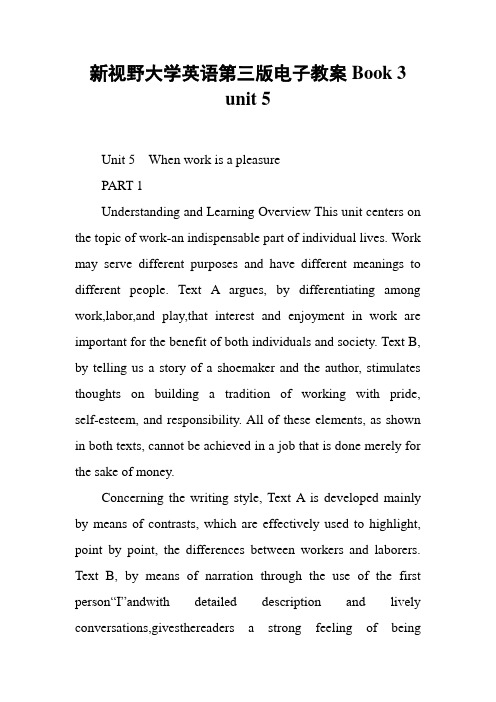
新视野大学英语第三版电子教案Book 3unit 5Unit 5 When work is a pleasurePART 1Understanding and Learning Overview This unit centers on the topic of work-an indispensable part of individual lives. Work may serve different purposes and have different meanings to different people. Text A argues, by differentiating among work,labor,and play,that interest and enjoyment in work are important for the benefit of both individuals and society. Text B, by telling us a story of a shoemaker and the author, stimulates thoughts on building a tradition of working with pride, self-esteem, and responsibility. All of these elements, as shown in both texts, cannot be achieved in a job that is done merely for the sake of money.Concerning the writing style, Text A is developed mainly by means of contrasts, which are effectively used to highlight, point by point, the differences between workers and laborers. Text B, by means of narration through the use of the first person“I”andwith detailed description and lively conversations,givesthereaders a strong feeling of beingpersonally on the scene,and achieves the effect of great vividness.In order for students to get a strong understanding ofthe unit theme and foster a good attitude toward work,the teacher should encourage thought-provoking discussions and activities. The topics for the discussions may includewhy we work, how we can foster love for work, how we achieve happiness at work, are peer interviews,retellingof Text B, questionnaire survey to gauge thehappiness level of a specific occupation and towork out how to achieve greater happiness at work.Section A Will you be a worker or a laborBackground information1 continuing educationContinuing education refers to the education for adults, usually in classes that are held in the evening and especially on subjects that are related to their jobs.2 experiential learningExperiential learning is the process of making meaning from direct experience. It is learning through reflection on doing, which is often contrasted with rote learning (死记硬背). Experiential learning focuses on the learning process for the individua1. An1example of experiential learning is going to the zoo and learning through observation and interaction with the zoo environment, as opposed to reading about animals from a book. Thus, one makes discoveries and experiments with knowledge firsthand, instead of hearing or reading about others’ experiences.Detailed study of the text1 In a society where slavery in the strict sense has been abolished, the socialindications around work,the value of work and the salary, have degraded many laborers into modern slaves-“wage slaves”.(Para. 1)Meaning: In a society where slavery, strictly speaking, has been put to an end, the social status of work, the value of work and the salary, have made many laborersbexxe modern slaves-“wage slaves”.★degrade:vt. treat sb. without respect and make them lose respect for themselves贬低(某人);羞辱(某人)The examination supervisor warned students not to degrade themselves by cheating on the exam.监考老师警告学生不要在考试中舞弊,以免自取其辱。
最新新视野大学英语第三版电子教案Book 3 unit 5教程文件
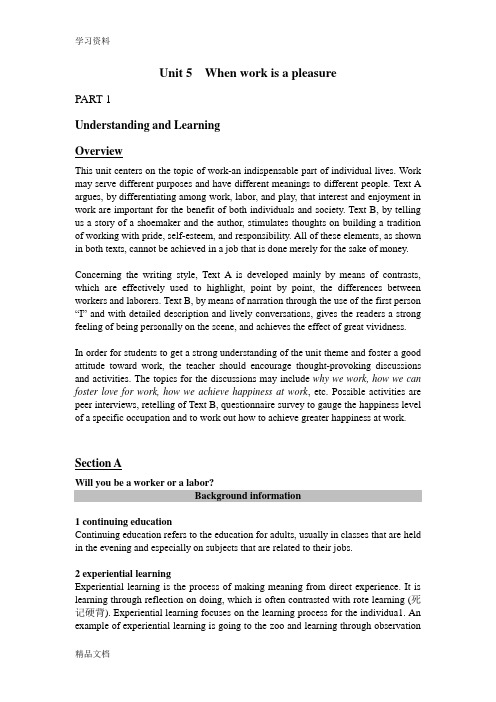
Unit 5 When work is a pleasurePART 1Understanding and LearningOverviewThis unit centers on the topic of work-an indispensable part of individual lives. Work may serve different purposes and have different meanings to different people. Text A argues, by differentiating among work, labor, and play, that interest and enjoyment in work are important for the benefit of both individuals and society. Text B, by telling us a story of a shoemaker and the author, stimulates thoughts on building a tradition of working with pride, self-esteem, and responsibility. All of these elements, as shown in both texts, cannot be achieved in a job that is done merely for the sake of money.Concerning the writing style, Text A is developed mainly by means of contrasts, which are effectively used to highlight, point by point, the differences between workers and laborers. Text B, by means of narration through the use of the first person “I” and with detailed description and lively conversations, gives the readers a strong feeling of being personally on the scene, and achieves the effect of great vividness.In order for students to get a strong understanding of the unit theme and foster a good attitude toward work, the teacher should encourage thought-provoking discussions and activities. The topics for the discussions may include why we work, how we can foster love for work, how we achieve happiness at work, etc. Possible activities are peer interviews, retelling of Text B, questionnaire survey to gauge the happiness level of a specific occupation and to work out how to achieve greater happiness at work. Section AWill you be a worker or a labor?Background information1 continuing educationContinuing education refers to the education for adults, usually in classes that are held in the evening and especially on subjects that are related to their jobs.2 experiential learningExperiential learning is the process of making meaning from direct experience. It is learning through reflection on doing, which is often contrasted with rote learning (死记硬背). Experiential learning focuses on the learning process for the individua1. An example of experiential learning is going to the zoo and learning through observationand interaction with the zoo environment, as opposed to reading about animals from a book. Thus, one makes discoveries and experiments with knowledge firsthand, instead of hearing or reading about others’ experiences.Detailed study of the text1In a society where slavery in the strict sense has been abolished, the social indications around work, the value of work and the salary, have degraded many laborers into modern slaves-“wage slaves”.(Para. 1)Meaning: In a society where slavery, strictly speaking, has been put to an end, the social status of work, the value of work and the salary, have made many laborers become modern slaves-“wage slaves”.★degrade:vt. treat sb. without respect and make them lose respect for themselves贬低(某人);羞辱(某人)The examination supervisor warned students not to degrade themselves by cheating on the exam.监考老师警告学生不要在考试中舞弊,以免自取其辱。
新视野大学英语第三版电子教案Book 3-Unit 3

UNIT3Life stories___________________ PART lUNDERSTANDING AND LEARNINGOverview________________________________________ Movies play an important role in almost everyone’s life. People from the movie industry have considerable influence on the masses. They exhibit personality traits that deserve admiration and applause, and could be looked up to as role models. This unit will fully explore their best qualities.The two texts in the current unit are biographies, a genre of literature, which is a written account of another person’s life. Each of the texts narrates, analyzes and interprets the most important facts of one prominent figure in the movie domain. Text A pays attention to actress Audrey Hepburn’s noble endeavor and her contribution to the cause of UNICEF, while Text B portrays the determination and fervent spirit of director and producer Steven Spielberg.The teacher can make students do additional research at the library, or Audrey Hepburn and Steven Spielberg in advance. Then in the classroom, the teacher may organize a variety of activities including pair work, group discussion, and mini-survey to talk about the films or the issue of fame, fortune, and social responsibility.Section A_________________________________________________ Audrey Hepburn-A true angel in this world1 Audrey HepburnAudrey Hepburn (1929-1993) was a slender, stylish motion picture actress known for her radiant beauty, her ability to project an air of sophistication tempered by a charming innocence, and her tireless efforts to aid needy children.Although born in Belgium, Hepburn had British citizenship through her father and attended school in England as a child. In 1939, however, at the onset of World War II, her mother(Hepburn’s father left the family when she was six years old) moved the child to the Netherlands (where the author of this text mistakenly considered Hepburn was born), thinking the neutral country safer than England. Throughout World War II, Hepburn endured hardships in Nazi-occupied Holland. She still managed, however, to attend school and take ballet lessons. After the war, she continued to study ballet in Amsterdam and in London. During her early 20s, she studied acting and worked as a model and dancer. After appearing in several British films and starring in the 1951 Broadway play Gigi (《琪琪》), Hepburn gained instant Hollywood stardom for playing the Academy Award-winning lead role in Roman Holiday. She remains one of few entertainers who have won Academy, Emmy, Grammy, and Tony Awards. Hepburn’s war-time struggles inspired her passion for humanitarian work. She devoted much of her later life to UNICEF, visiting famine-stricken villages, in Latin America, Africa, until shortly before her death of cancer in 1993. She was awarded the Presidential Medal of Freedom in recognition of her work as a UNICEF Goodwill Ambassador in 1992.2 UNICEFUNICEF (United Nations International Children’s Emergency Fund) was created by the United Nations General Assembly on December 11, 1946, to provide emergency food and healthcare to children in countries that had been devastated by World War II. After 1950 the fund directed its efforts toward general programs for the improvement of children’s welfare, particularly in less-developed countries and in various emergency situations. The organization’s broader mission was reflected in the name it adopted in 1953, the United Nations Children’s Fund, but it has continued to be known by the popular acronym based on this old name. Headquartered in New York City, UNICEF provides long-term humanitarian and developmental assistance to children and mothers in developing countries. UNICEF’s programs emphasize developing community-level services to promote the health and well-being of children.3 UNICEF Ambassador of GoodwillMany celebrities have acted as international, regional or national ambassadors, depending on their profile, interests, and desired level of responsibility. The role of Goodwill Ambassador allows celebrities with a demonstrated interest in UNICEFissues to use their fame to draw attention to important issues. This may take the form of public appearances and talks, visits to troubled regions, and use of their political access to advocate UNICEF causes, all of which have the power to draw attention from the media and to create public awareness.4 Gregory PeckGregory Peck (1916-2003) was one of the world’s most popular film stars from the 1940s to the 1960s. He is best known for his performance in the 1962 film To Kill a Mockingbird, which earned him the Academy Award for Best Actor.In 1967 Peck received the Academy’s Jean Hersholt Humanitarian Award. He was also in 1969 for his lifetime humanitarian effort. Always politically progressive, Peck was active in such causes as anti-war protests, workers’ rights and civil rights.5 Billy WilderBilly Wilder (1906-2002) was an Austrian-born American filmmaker, screenwriter, producer artist, and journalist. His career spanned more than 50 years and 60 films. He is regarded as one of the most brilliant and versatile filmmakers of Hollywood’s golden age. During his career, Wilder gained 20 Academy Award nominations and won six Oscars. He received a lifetime achievement award from the American Film Institute in 1986.6 Academy AwardsAn Academy Award (byname Oscar) is an award presented annually by the American Academy of Motion Picture Arts and Science to recognize excellence of professionals in the film industry, including directors , actors , and writers. The award ceremony is one of the most prominent award ceremonies in the world, and is televised live in more than 200 countries annually.7 Hubert de GivenchyHubert de Givenchy (1927-,) is a French aristocrat and fashion designer who founder The House of Givenchy in 1952. He is famous for having designed much of the personal and professional wardrobe of Audrey Hepburn, as well as clothing for clients such as Jacqueline Kennedy. He was named to the International Best Dress List Hall of Fame in 1970.Detailed study of the text1 Audrey Hepburn thrilled audiences with starring roles in noteworthy films... (Para.1)Meaning: Audrey Hepburn played leading roles in many extraordinary films, and such poles gave great pleasure to the people who watched the films…★noteworthy: a. important or interesting enough to deserve your attention 值得注意的;显著的One of the most noteworthy trends in contemporary American higher education is the tendency among community colleges to offer certificate programs besides the traditional associate degrees.当代美国高等教育最显著的趋势之一就是社区大学除了授予传统的副学士学位,还开设学历课程。
新视野大学英语读写(第三版)Book3-Unit-4教案
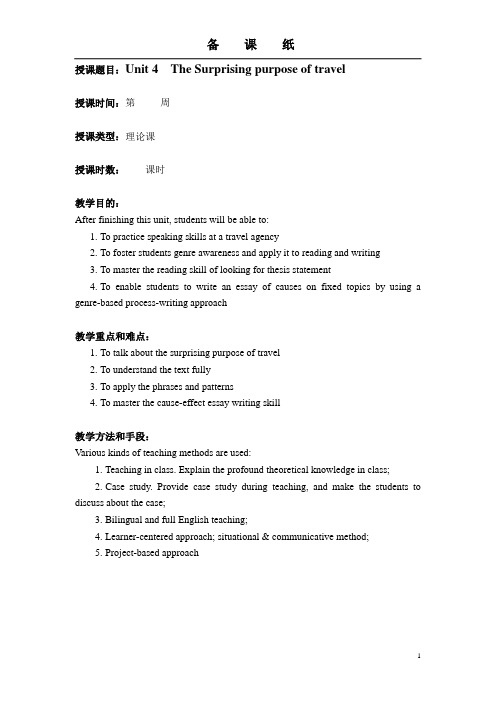
授课题目:Unit 4 The Surprising purpose of travel授课时间:第_____周授课类型:理论课授课时数:____课时教学目的:After finishing this unit, students will be able to:1.To practice speaking skills at a travel agency2.To foster students genre awareness and apply it to reading and writing3.To master the reading skill of looking for thesis statement4.To enable students to write an essay of causes on fixed topics by using a genre-based process-writing approach教学重点和难点:1.To talk about the surprising purpose of travel2.To understand the text fully3.To apply the phrases and patterns4.To master the cause-effect essay writing skill教学方法和手段:Various kinds of teaching methods are used:1.Teaching in class. Explain the profound theoretical knowledge in class;2.Case study. Provide case study during teaching, and make the students to discuss about the case;3.Bilingual and full English teaching;4.Learner-centered approach; situational & communicative method;5.Project-based approach教学内容和过程:Section A The surprising purpose of travelStep One Warming-up Activities 30 minutesI. Write as many words related to travel as you can•Varieties of travel•Means of transportation•Tourist attractions•Entertainment activities•Things to take•Where to stay•Other words about travelII. Lead-in questions:1.Do you like travelling? What are the reasons for you to travel?•To have a change•To experience something new and unfamiliar•To see the world and understand different culture•To marvel at the wonder of great nature•To escape from a boring lifestyle•To have a thorough relaxation•To broaden one’s horizons2.What’s your suggestion to a student who wants to have a trip but doesn’thave enough money for it?•Plan ahead•Find useful information•Travel in group•Go to a less-known place•Pack necessary thingsIII Background knowledge1.Where is Left Bank café? What features does it have?•The Left Bank café is located in the village of Saranac Lake on the Left Bank of the River Seine in Paris. It is a favorite meeting place of great artists, writers, and famous intellectuals since the early 20th century. LBC serves authentic French café-style food, including crêpes and tar tines, as well ascoffee, tea, wines and beers.2.What is Let’s Go? Give more information about it.• A world-renowned travel guide series, researched, written, edited, and run entirely by students at Harvard University.•It is claimed to be “the student travel guide” aimed at readers “both young and young at heart”.•Let’s Go was founded in 1960 and is headquartered in Cambridge, Massachusetts, the US. Office.3. What do you know about Machu Picchu?•An ancient ruined South American city high up in the Andes Mountains in Peru.•It was built by the Incas, a Native American people of South America, in about 1500 AD,•It has a temple of the sun and many other buildings.•It is a popular place for tourists to visit.Step Two Text Study 80 minutesI.Interactive reading of the text1. Reading comprehension1)Why does the author choose the word “burdensome” to describe hisimaginary travel? (Para. 1)2)What does the author mean by “the rest of the journey can feel like a tediousl esson in the ills of modernity? It sucks.”? (Para. 2)3)Suppose travel is troublesome and sometimes even unpleasant, why do wetravel according to the author? (Para. 2-4)4)What kind of travel is truly compulsory? (Para. 4)5)What is the irony when people travel to Paris trying to leave all thosetroubles behind? (Para. 5)6)What is the finding of the research? What does the author wants to prove byreferring to the example? (Para. 6)7)What do we need to do to trigger our creativity? (Para. 8)8)What are the secret cornerstones of creativity of travel?What will happen to usafter travel? (Para. 9)2. Structure of the textPart I Introduction (Paras. 1-4)The author gives us a vivid description of the imaginary travel experience, including how he struggles to get up in the early morning, how he gets to the flight gate after all trouble and how he finally gets stuck in the airport. The author puts forward a question: Why do we travel?Part II Body (Paras. 5-8)The author takes us to rethink the question: what is the real purpose of travel? Besides, she shares her own understanding of the real purpose of travel.Part III Concluding part (Para 9)We travel because we need to, because distance and difference are the secret cornerstones of creativity..3. Summary of the TextTravel is ___________ and sometimes even unpleasant; then what is the driving force behind our travel? We travel because we need to. Sometimes our travel is a ____ because we should attend the business luncheon, because we should celebrate Thanksgiving with our mom. We travel because we want to.Owing to the fact that most travel is _______, we just travel following our heart. Most people travel for the sake of __________, but their mind tends to solve the stubborn ___________ issues while on vacation. What is the real purpose of travel? Travelling to a new place can make us less controlled by familiar cognitive ________ that imprison us. As a result, we can better combine the new with the old, the mundane is ________ from a slightly more abstract perspective.To __________ travelers, multicultural contrast means that they are open to ambiguity and willing to see the world in different ways, thus to expand the ______________ of their “cognitive inputs” as they refuse to __________t heir first answers and initial guesses. Of course, that mental flexibility is a side effect of difference and we know what we did not know in the past, by which we become more open-minded and less _______.Apart from its advantages, travel also has it _________, which make us not take great pleasantness. More often than not, we need a _________ after our vacation. We travel because we need to, because distance and difference are the _____________of creativity. Travel will change our mind to some extent, which inturn can have ________on everything in our life.II. Language Focus: Words and expressions1. Key words:1)groan: (Para.1)vi. make a long low sound, e.g. because you are in pain or unhappy (因痛苦或烦恼等)呻吟,发出哼哼声The old man was groaning with pain.v. speak about sth. in a way that shows you are unhappy 抱怨She sat down beside me and groaned about her working day. 她坐在我身旁,抱怨自己整日辛劳。
新视野大学英语第三册unit 3教案

journal,
consume,
supplement,
absorb,rຫໍສະໝຸດ strict,typical,
calculate, sufficient, compound, modify, interfere, strengthen, imply, proposal, possess, obstacle, concentrate, tackle, density. 2. Translation: 在世界杯比赛中我们先输了几场,但后来又赢回来了。 We lost two or three early games in the World Cup, but we bounced back. 锻炼了那么久,你当然需要喝很多水。 After a long time of exercise, you certainly need to take in plenty of water. 因为不能应付日常生活,他们处于崩溃的边缘。 Not being able to cope with everyday life, they were tipped over the edge into breakdown. 你不能让家庭责任干扰你的工作。 You mustn’t allow your family duties to interfere with your work. 这本书已经印了三次了。 The book has gone through three printings. 新法律适用于所有人。 The new law applies to everyone. 他应市长邀请访问了该城市。 He went to visit the city in response to the invitation from the mayor. II New Content: 1. Warm-up activities ⑴. Background of Hyde School. ⑵. Guide the students to discuss what are the most important principles in education. 2. Understanding of Text A ⑴. What does the Hyde School see as its main job when educating children? ⑵. What is the biggest challenge that the Hyde School faces in carrying out their work? ⑶. When you went to elementary or middle school, how were your parents involved in your education?
新视野大学英语book3unit3教案
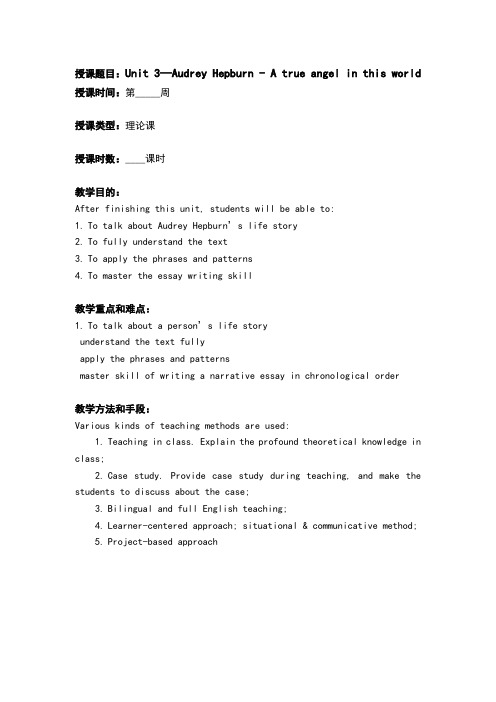
授课题目:Unit 3—Audrey Hepburn - A true angel in this world 授课时间:第_____周授课类型:理论课授课时数:____课时教学目的:After finishing this unit, students will be able to:1.To talk about Audrey Hepburn’s life story2.To fully understand the text3.To apply the phrases and patterns4.To master the essay writing skill教学重点和难点:1.To talk about a person’s life storyunderstand the text fullyapply the phrases and patternsmaster skill of writing a narrative essay in chronological order教学方法和手段:Various kinds of teaching methods are used:1.Teaching in class. Explain the profound theoretical knowledge in class;2.Case study. Provide case study during teaching, and make the students to discuss about the case;3.Bilingual and full English teaching;4.Learner-centered approach; situational & communicative method;5.Project-based approach教学内容和过程:Section A Audrey Hepburn - A true angel in this worl dPre-reading ActivitiesStep 1. GreetingsGreet the whole class warmly.Step 2. Lead-in and preparation for readingQuotes:Go confidently in the direction of your dreams. Live the life you’ve imagined.— Henry David ThoreauDon’t judge each day by the harvest you reap, but by the seeds you plant.— Robert Louis StevensonLet them talk to each other about the following questions:1. Match the names of the people with the movies directed or starred by them.was Audrey Hepburn3. Can you name some of the famous movies starred by Audrey4. How did Audrey Hepburn influence the worldWatch and talkWatch the video about Audrey Hepburn, take down the key points and then make a presentation about her life story.1929-1944 a ballet dancer1948-1951 a young actress1952-1953 a successful actress1954-1989 a mature actress1988-1993 a great humanitarianCultural background: UNICEFQuestions Previewing1. How did UNICEF come into beingUNICEF (United Nations International Children’s Emergency Fund) was created by theUnited Nations General Assembly on December 11, 1946, to provide emergency food andhealthcare to children in countries that had been devastated by World War II.2. What is UNICEF’s major taskUNICEF provides long-term humanitarian and developmental assistance to children andmothers in developing countries. UNICEF’s programs emphasize developing communitylevel services to promote the health and well-being of children.3. What is the role of UNICEF Ambassador of GoodwillThe role of Goodwill Ambassador allows celebrities with a demonstrated interest in UNICEF issues to use their fame to draw attention to important issues and create public awareness.Step 3. Fast readingAsk the Students to read the passage as quickly as they can and then answer the questions on the screen. Let them get the main idea of each paragraph and make clear about the text structure.Text structure: ( structured writing ) The passage can be divided into 3 parts.Part I — (Paras. 1-2)Audrey Hepburn was successful in the film domain, but she most preferred playing the roles of a mother and a UNICEF Goodwill Ambassador.Part II — (Paras. 3- 14)This part tells of the life story of Audrey Hepburn. She transcended the challenges in her earlier life and became an internationally famous actress. But she remained a generous, simple and compassionate woman and devoted her later years to humanitarian work as a Goodwill Ambassador for UNICEF. Though she died of cancer, her passion for service was enduring.Part III — (Para. 15)From Audrey’s words, we can see the majesty of her spirit of social responsibility and dedication.Structure of the textPurpose: Improve the students’ reading and writing ability and understand the general idea of each paragraph.Method: Read the text individually and talk in groups; Use task-based language teaching method, reading approach, communicative approach and total physical response method.Step 4: While-reading ActivitiesStudents are required to look at the Words and Phrases on the screen and give a brief presentation in class.Words and Phrases:Purpose: Train the Students’ ability of understandi ng and using foreign language.Method: Talk in groups, Use task-based language teaching method, communicative approach and total physical response method.Practical phrases1. be afflicted by 受…痛苦;受…折磨由于遭受无休止战争的折磨,人们生活在极度贫困之中。
第三版新视野大学英语3读写教程books3unit3译文及讲解
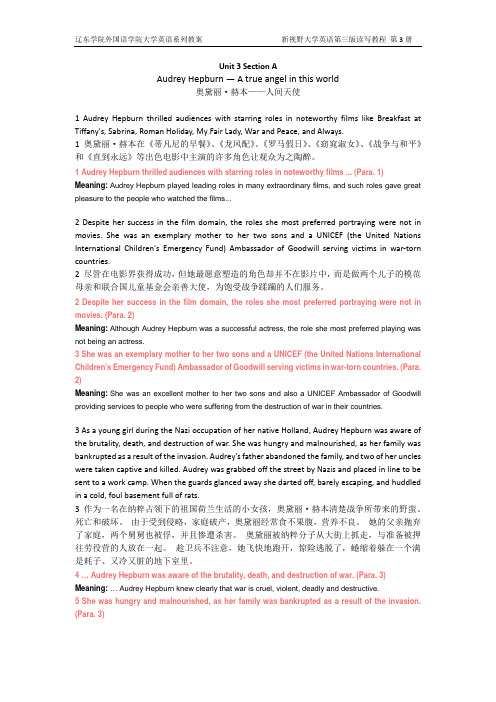
Unit 3 Section AAudrey Hepburn — A true angel in this world奥黛丽·赫本——人间天使1 Audrey Hepburn thrilled audiences with starring roles in noteworthy films like Breakfast at Tiffany's, Sabrina, Roman Holiday, My Fair Lady, War and Peace, and Always.1 奥黛丽·赫本在《蒂凡尼的早餐》、《龙凤配》、《罗马假日》、《窈窕淑女》、《战争与和平》和《直到永远》等出色电影中主演的许多角色让观众为之陶醉。
1 Audrey Hepburn thrilled audiences with starring roles in noteworthy films ... (Para. 1) Meaning: Audrey Hepburn played leading roles in many extraordinary films, and such roles gave greatpleasure to the people who watched the films...2 Despite her success in the film domain, the roles she most preferred portraying were not in movies. She was an exemplary mother to her two sons and a UNICEF (the United Nations International Children's Emergency Fund) Ambassador of Goodwill serving victims in war‐torn countries.2 尽管在电影界获得成功,但她最愿意塑造的角色却并不在影片中,而是做两个儿子的模范母亲和联合国儿童基金会亲善大使,为饱受战争蹂躏的人们服务。
新视野大学英语第三版读写教程Book3-Unit4-The Surprising purpose of travel教案
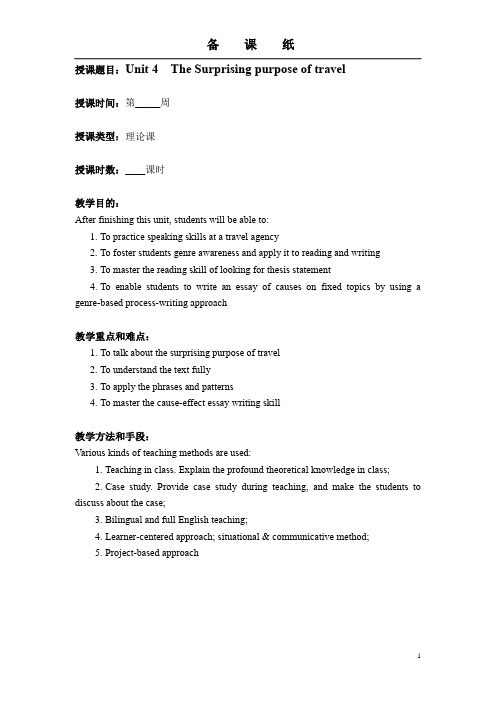
授课题目:Unit 4 The Surprising purpose of travel授课时间:第_____周授课类型:理论课授课时数:____课时教学目的:After finishing this unit, students will be able to:1.To practice speaking skills at a travel agency2.To foster students genre awareness and apply it to reading and writing3.To master the reading skill of looking for thesis statement4.To enable students to write an essay of causes on fixed topics by using a genre-based process-writing approach教学重点和难点:1.To talk about the surprising purpose of travel2.To understand the text fully3.To apply the phrases and patterns4.To master the cause-effect essay writing skill教学方法和手段:Various kinds of teaching methods are used:1.Teaching in class. Explain the profound theoretical knowledge in class;2.Case study. Provide case study during teaching, and make the students to discuss about the case;3.Bilingual and full English teaching;4.Learner-centered approach; situational & communicative method;5.Project-based approach教学内容和过程:Section A The surprising purpose of travelStep One Warming-up Activities 30 minutesI. Write as many words related to travel as you can•Varieties of travel•Means of transportation•Tourist attractions•Entertainment activities•Things to take•Where to stay•Other words about travelII. Lead-in questions:1.Do you like travelling? What are the reasons for you to travel?•To have a change•To experience something new and unfamiliar•To see the world and understand different culture•To marvel at the wonder of great nature•To escape from a boring lifestyle•To have a thorough relaxation•To broaden one’s horizons2.What’s your suggestion to a student who wants to have a trip but doesn’thave enough money for it?•Plan ahead•Find useful information•Travel in group•Go to a less-known place•Pack necessary thingsIII Background knowledge1.Where is Left Bank café? What features does it have?•The Left Bank café is located in the village of Saranac Lake on the Left Bank of the River Seine in Paris. It is a favorite meeting place of great artists, writers, and famous intellectuals since the early 20th century. LBC serves authentic French café-style food, including crêpes and tar tines, as well ascoffee, tea, wines and beers.2.What is Let’s Go? Give more information about it.• A world-renowned travel guide series, researched, written, edited, and run entirely by students at Harvard University.•It is claimed to be “the student travel guide” aimed at readers “both young and young at heart”.•Let’s Go was founded in 1960 and is headquartered in Cambridge, Massachusetts, the US. Office.3. What do you know about Machu Picchu?•An ancient ruined South American city high up in the Andes Mountains in Peru.•It was built by the Incas, a Native American people of South America, in about 1500 AD,•It has a temple of the sun and many other buildings.•It is a popular place for tourists to visit.Step Two Text Study 80 minutesI.Interactive reading of the text1. Reading comprehension1)Why does the author choose the word “burdensome” to describe hisimaginary travel? (Para. 1)2)What does the author mean by “the rest of the journey can feel like a tediousl esson in the ills of modernity? It sucks.”? (Para. 2)3)Suppose travel is troublesome and sometimes even unpleasant, why do wetravel according to the author? (Para. 2-4)4)What kind of travel is truly compulsory? (Para. 4)5)What is the irony when people travel to Paris trying to leave all thosetroubles behind? (Para. 5)6)What is the finding of the research? What does the author wants to prove byreferring to the example? (Para. 6)7)What do we need to do to trigger our creativity? (Para. 8)8)What are the secret cornerstones of creativity of travel?What will happen to usafter travel? (Para. 9)2. Structure of the textPart I Introduction (Paras. 1-4)The author gives us a vivid description of the imaginary travel experience, including how he struggles to get up in the early morning, how he gets to the flight gate after all trouble and how he finally gets stuck in the airport. The author puts forward a question: Why do we travel?Part II Body (Paras. 5-8)The author takes us to rethink the question: what is the real purpose of travel? Besides, she shares her own understanding of the real purpose of travel.Part III Concluding part (Para 9)We travel because we need to, because distance and difference are the secret cornerstones of creativity..3. Summary of the TextTravel is ___________ and sometimes even unpleasant; then what is the driving force behind our travel? We travel because we need to. Sometimes our travel is a ____ because we should attend the business luncheon, because we should celebrate Thanksgiving with our mom. We travel because we want to.Owing to the fact that most travel is _______, we just travel following our heart. Most people travel for the sake of __________, but their mind tends to solve the stubborn ___________ issues while on vacation. What is the real purpose of travel? Travelling to a new place can make us less controlled by familiar cognitive ________ that imprison us. As a result, we can better combine the new with the old, the mundane is ________ from a slightly more abstract perspective.To __________ travelers, multicultural contrast means that they are open to ambiguity and willing to see the world in different ways, thus to expand the ______________ of their “cognitive inputs” as they refuse to __________t heir first answers and initial guesses. Of course, that mental flexibility is a side effect of difference and we know what we did not know in the past, by which we become more open-minded and less _______.Apart from its advantages, travel also has it _________, which make us not take great pleasantness. More often than not, we need a _________ after our vacation. We travel because we need to, because distance and difference are the _____________of creativity. Travel will change our mind to some extent, which inturn can have ________on everything in our life.II. Language Focus: Words and expressions1. Key words:1)groan: (Para.1)vi. make a long low sound, e.g. because you are in pain or unhappy (因痛苦或烦恼等)呻吟,发出哼哼声The old man was groaning with pain.v. speak about sth. in a way that shows you are unhappy 抱怨She sat down beside me and groaned about her working day. 她坐在我身旁,抱怨自己整日辛劳。
新视野大学英语(第三版)读写教程第三册教案(全册)
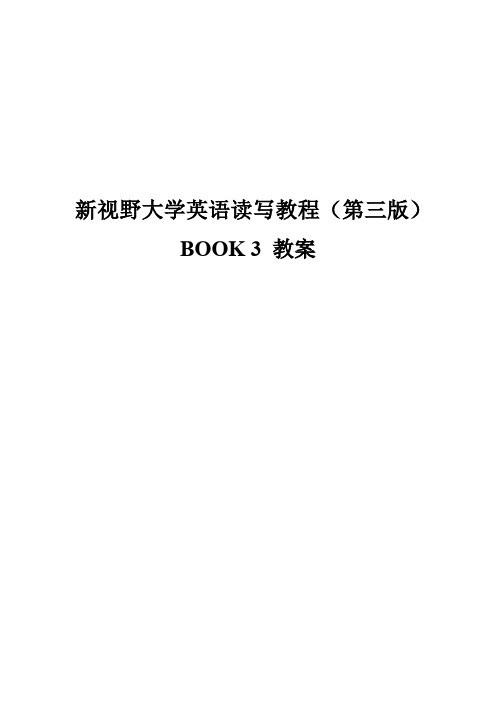
新视野大学英语读写教程(第三版)BOOK 3 教案UNIT3Life stories___________________ PART lUNDERSTANDING AND LEARNINGOverview________________________________________ Movies play an important role in almost everyone’s life. People from the movie industry have considerable influence on the masses. They exhibit personality traits that deserve admiration and applause, and could be looked up to as role models. This unit will fully explore their best qualities.The two texts in the current unit are biographies, a genre of literature, which is a written account of another person’s life. Each of the texts narrates, analyzes and interprets the most important facts of one prominent figure in the movie domain. Text A pays attention to actress Audrey Hepburn’s noble endeavor and her contribution to the cause of UNICEF, while Text B portrays the determination and fervent spirit of director and producer Steven Spielberg.The teacher can make students do additional research at the library, or Audrey Hepburn and Steven Spielberg in advance. Then in the classroom, the teacher may organize a variety of activities including pair work, group discussion, and mini-survey to talk about the films or the issue of fame, fortune, and social responsibility.Section A_________________________________________________ Audrey Hepburn-A true angel in this world1 Audrey HepburnAudrey Hepburn (1929-1993) was a slender, stylish motion picture actress known for her radiant beauty, her ability to project an air of sophistication tempered by a charming innocence, and her tireless efforts to aid needy children.Although born in Belgium, Hepburn had British citizenship through her father and attended school in England as a child. In 1939, however, at the onset of World War II, her mother(Hepburn’s father left the family when she was six years old) moved the child to the Netherlands (where the author of this text mistakenly considered Hepburn was born), thinking the neutral country safer than England. Throughout World War II, Hepburn endured hardships in Nazi-occupied Holland. She still managed, however, to attend school and take ballet lessons. After the war, she continued to study ballet in Amsterdam and in London. During her early 20s, she studied acting and worked as a model and dancer. After appearing in several British films and starring in the 1951 Broadway play Gigi (《琪琪》), Hepburn gained instant Hollywood stardom for playing the Academy Award-winning lead role in Roman Holiday. She remains one of few entertainers who have won Academy, Emmy, Grammy, and Tony Awards. Hepburn’s war-time struggles inspired her passion for humanitarian work. She devoted much of her later life to UNICEF, visiting famine-stricken villages, in Latin America, Africa, until shortly before her death of cancer in 1993. She was awarded the Presidential Medal of Freedom in recognition of her work as a UNICEF Goodwill Ambassador in 1992.2 UNICEFUNICEF (United Nations International Children’s Emergency Fund) was created by the United Nations General Assembly on December 11, 1946, to provide emergency food and healthcare to children in countries that had been devastated by World War II. After 1950 the fund directed its efforts toward general programs for the improvement of children’s welfare, particularly in less-developed countries and in various emergency situations. The organization’s broader mission was reflected in the name it adopted in 1953, the United Nations Children’s Fund, but it has continued to be known by the popular acronym based on this old name. Headquartered in New York City, UNICEF provides long-term humanitarian and developmental assistance to children and mothers in developing countries. UNICEF’s programs emphasize developing community-level services to promote the health and well-being of children.3 UNICEF Ambassador of GoodwillMany celebrities have acted as international, regional or national ambassadors, depending on their profile, interests, and desired level of responsibility. The role of Goodwill Ambassador allows celebrities with a demonstrated interest in UNICEF issues to use their fame to draw attention to important issues. This may take the formof public appearances and talks, visits to troubled regions, and use of their political access to advocate UNICEF causes, all of which have the power to draw attention from the media and to create public awareness.4 Gregory PeckGregory Peck (1916-2003) was one of the world’s most popular film stars from the 1940s to the 1960s. He is best known for his performance in the 1962 film To Kill a Mockingbird, which earned him the Academy Award for Best Actor.In 1967 Peck received the Academy’s Jean Hersholt Humanitarian Award. He was also in 1969 for his lifetime humanitarian effort. Always politically progressive, Peck was active in such causes as anti-war protests, workers’ rights and civil rights.5 Billy WilderBilly Wilder (1906-2002) was an Austrian-born American filmmaker, screenwriter, producer artist, and journalist. His career spanned more than 50 years and 60 films. He is regarded as one of the most brilliant and versatile filmmakers of Hollywood’s golden age. During his career, Wilder gained 20 Academy Award nominations and won six Oscars. He received a lifetime achievement award from the American Film Institute in 1986.6 Academy AwardsAn Academy Award (byname Oscar) is an award presented annually by the American Academy of Motion Picture Arts and Science to recognize excellence of professionals in the film industry, including directors , actors , and writers. The award ceremony is one of the most prominent award ceremonies in the world, and is televised live in more than 200 countries annually.7 Hubert de GivenchyHubert de Givenchy (1927-,) is a French aristocrat and fashion designer who founder The House of Givenchy in 1952. He is famous for having designed much of the personal and professional wardrobe of Audrey Hepburn, as well as clothing for clients such as Jacqueline Kennedy. He was named to the International Best Dress List Hall of Fame in 1970.Detailed study of the text1 Audrey Hepburn thrilled audiences with starring roles in noteworthy films... (Para.1)Meaning: Audrey Hepburn played leading roles in many extraordinary films, and such poles gave great pleasure to the people who watched the films…★noteworthy: a. important or interesting enough to deserve your attention 值得注意的;显著的One of the most noteworthy trends in contemporary American higher education is the tendency among community colleges to offer certificate programs besides the traditional associate degrees.当代美国高等教育最显著的趋势之一就是社区大学除了授予传统的副学士学位,还开设学历课程。
新视野英语教程教案book3unit3
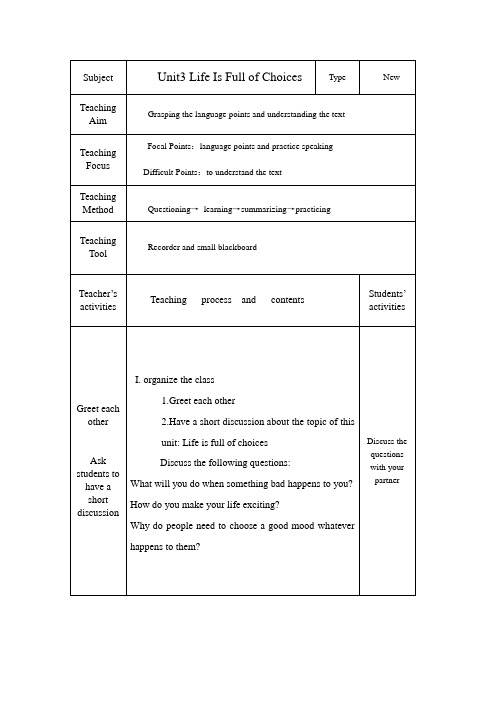
3.Can Michael be positive all the time? Why or why not?
4.How does Michael deal with something miserable if it happens to him?
III. Language points:
1. run-of-the-mill----- ordinary with
no special or interesting features
2."If I were any better, I'd be twins!"
Please notice the subjunctive mood used in the sentence. English peopleuse this expression to tell others that they are in a very happy mood.
Discussthe following questions:
Whatwill you do when something badhappens to you?
How do you make your life exciting?
Why do people need to choose a good mood whatever happens to them?
Dothe exercise
V. Sum-up
VI. Assignments
so; to such a degree
那么;那样;到那种程度
新视野大学英语book 3 unit 3 教案
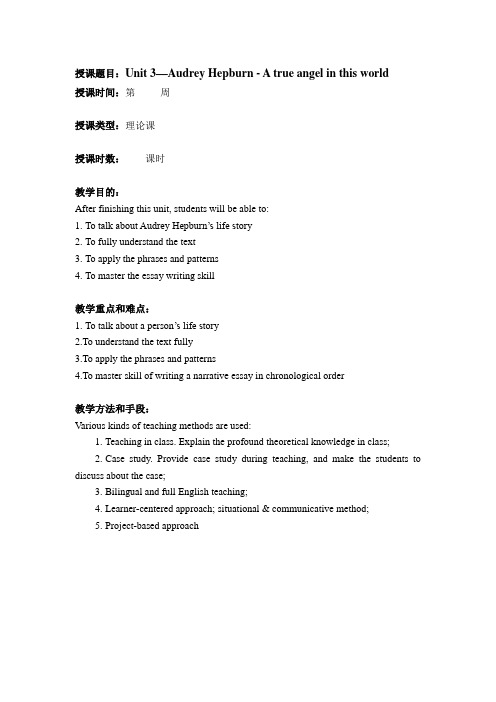
授课题目:Unit 3—Audrey Hepburn - A true angel in this world授课时间:第_____周授课类型:理论课授课时数:____课时教学目的:After finishing this unit, students will be able to:1.To talk about Audrey Hepburn’s life story2.To fully understand the text3.To apply the phrases and patterns4.To master the essay writing skill教学重点和难点:1.To talk about a person’s life story2.To understand the text fully3.To apply the phrases and patterns4.To master skill of writing a narrative essay in chronological order教学方法和手段:Various kinds of teaching methods are used:1.Teaching in class. Explain the profound theoretical knowledge in class;2.Case study. Provide case study during teaching, and make the students to discuss about the case;3.Bilingual and full English teaching;4.Learner-centered approach; situational & communicative method;5.Project-based approach教学内容和过程:Section A Audrey Hepburn - A true angel in this worl dPre-reading ActivitiesStep 1. GreetingsGreet the whole class warmly.Step 2. Lead-in and preparation for readingQuotes:Go confidently in the direction of your dreams. Live the life you’ve imagined.—Henry David ThoreauDon’t judge each day by the harvest you reap, but by the seeds you plant.—Robert Louis Stevenson Let them talk to each other about the following questions:1. Match the names of the people with the movies directed or starred by them.2.Who was Audrey Hepburn?3. Can you name some of the famous movies starred by Audrey?4. How did Audrey Hepburn influence the world?Watch and talkWatch the video about Audrey Hepburn, take down the key points and then make a presentation about her life story.1929-1944 a ballet dancer1948-1951 a young actress1952-1953 a successful actress1954-1989 a mature actress1988-1993 a great humanitarianCultural background: UNICEFQuestions Previewing1. How did UNICEF come into being?UNICEF (United Nations International Children’s Emergency Fund) was created by the United Nations General Assembly on December 11, 1946, to provide emergency food and healthcare to children in countries that had been devastated by World War II.2. What is UNICEF’s major task?UNICEF provides long-term humanitarian and developmental assistance to children and mothers in developing countries. UNICEF’s programs emphasize developing community level services to promote the health and well-being of children.3. What is the role of UNICEF Ambassador of Goodwill?The role of Goodwill Ambassador allows celebrities with a demonstrated interest in UNICEF issues to use their fame to draw attention to important issues and create public awareness.Step 3. Fast readingAsk the Students to read the passage as quickly as they can and then answer thequestions on the screen. Let them get the main idea of each paragraph and make clearabout the text structure.Text structure: ( structured writing ) The passage can be divided into 3 parts.Part I —(Paras. 1-2)Audrey Hepburn was successful in the film domain, but she most preferred playing the roles of a mother and a UNICEF Goodwill Ambassador.Part II —(Paras. 3- 14)This part tells of the life story of Audrey Hepburn. She transcended the challenges in her earlier life and became an internationally famous actress. But she remained a generous, simple and compassionate woman and devoted her later years to humanitarian work as a Goodwill Ambassador for UNICEF. Though she died of cancer, her passion for service was enduring.Part III —(Para. 15)From Audrey’s words, we can see the majesty of her spirit of social responsibility and dedication. Structure of the textPurpose: Improve the students’reading and writing ability and understand the general idea of each paragraph.Method: Read the text individually and talk in groups; Use task-based language teaching method, reading approach, communicative approach and total physical response method.Step 4: While-reading ActivitiesStudents are required to look at the Words and Phrases on the screen and give a brief presentation in class.Words and Phrases:Purpose: Train the Students’ ability of understandi ng and using foreign language.Method:Talk in groups, Use task-based language teaching method, communicative approach and total physical response method.Practical phrases1. be afflicted by 受…痛苦;受…折磨由于遭受无休止战争的折磨,人们生活在极度贫困之中。
新视野大学英语三unit3教案
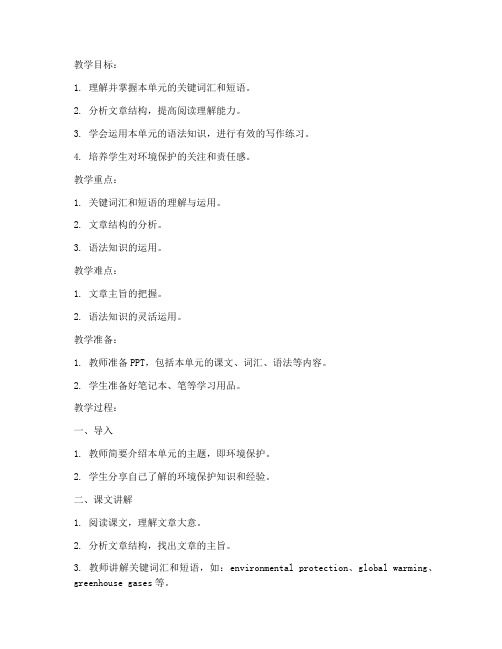
教学目标:1. 理解并掌握本单元的关键词汇和短语。
2. 分析文章结构,提高阅读理解能力。
3. 学会运用本单元的语法知识,进行有效的写作练习。
4. 培养学生对环境保护的关注和责任感。
教学重点:1. 关键词汇和短语的理解与运用。
2. 文章结构的分析。
3. 语法知识的运用。
教学难点:1. 文章主旨的把握。
2. 语法知识的灵活运用。
教学准备:1. 教师准备PPT,包括本单元的课文、词汇、语法等内容。
2. 学生准备好笔记本、笔等学习用品。
教学过程:一、导入1. 教师简要介绍本单元的主题,即环境保护。
2. 学生分享自己了解的环境保护知识和经验。
二、课文讲解1. 阅读课文,理解文章大意。
2. 分析文章结构,找出文章的主旨。
3. 教师讲解关键词汇和短语,如:environmental protection、global warming、greenhouse gases等。
4. 分析文章中的语法知识,如:现在分词作状语、过去分词作定语等。
三、练习环节1. 词汇练习:让学生根据课文内容,找出本单元的关键词汇和短语,并进行造句练习。
2. 阅读理解练习:让学生阅读相关材料,回答问题,检验对文章内容的理解程度。
3. 写作练习:让学生运用本单元的语法知识,写一篇关于环境保护的短文。
四、课堂讨论1. 学生分组讨论,分享自己对环境保护的看法和建议。
2. 教师引导学生思考如何从自身做起,为环境保护贡献力量。
五、总结与作业1. 教师对本节课的内容进行总结,强调环境保护的重要性。
2. 布置作业:让学生写一篇关于环境保护的短文,要求运用本单元的语法知识和词汇。
教学反思:1. 本节课通过讲解课文、词汇和语法,使学生掌握了本单元的知识。
2. 课堂讨论环节有助于培养学生的环保意识和责任感。
3. 教师应关注学生的个体差异,针对不同层次的学生进行有针对性的教学。
新视野大学英语第三版电子教案Book-3-Unit-3演示教学

新视野大学英语第三版电子教案B o o k-3-U n i t-33l’s . . , . . , a , a ’s . , .A ’s ,B ., . ,a , , , , .1(1929-1993) a , , a , .Belgium, England a . 1939, , ,(’s ) ( ), . ,Holland. , , . , Amsterdam London.20s, a . 1951 (《琪琪》), . , , , .’s . , , , Africa, 1993.a 1992.2( ’s ) 11, 1946, .1950 ’s , . ’s1953, ’s , . , . ’s .3, , , , .a . , , ,.4(1916-2003) ’s 1940s 1960s.1962 a , .1967 ’s . 1969 . , , ’ .5(1906-2002) , , , . 50 60 . Hollywood’s . , 20 . a 1986.6( ) , , , . , 200 .7(1927-,) a1952. , . 1970.1 ... (.1): , …★: a. 值得注意的;显著的.当代美国高等教育最显著的趋势之一就是社区大学除了授予传统的副学士学位,还开设学历课程。
2 , . (. 2): a , .★: n.[C] (.) , , , . a , , . (活动、兴趣或知识的)领域,范围,范畴.临床领域近期的研究得益于多种测量方法结合使用。
★: .1) a a , , 扮演(角色). 听说波特曼学习舞蹈是为了更好的扮演她的角色。
2) (~ . / . .) . . a , 把某人/某物描写成某种样子.律师往往将自己的当事人描述成受人误导的贫困青年。
3 a ( ’s ) . (.2): a .★: a. a 模范的;可作楷模的a . 玛丽对学生而言是一位模范教师,对同事而言是一位值得信任和珍惜的朋友。
- 1、下载文档前请自行甄别文档内容的完整性,平台不提供额外的编辑、内容补充、找答案等附加服务。
- 2、"仅部分预览"的文档,不可在线预览部分如存在完整性等问题,可反馈申请退款(可完整预览的文档不适用该条件!)。
- 3、如文档侵犯您的权益,请联系客服反馈,我们会尽快为您处理(人工客服工作时间:9:00-18:30)。
Unit 5 When work is a pleasurePART 1Understanding and LearningOverviewThis unit centers on the topic of work-an indispensable part of individual lives. Work may serve different purposes and have different meanings to different people. Text A argues, by differentiating among work, labor, and play, that interest and enjoyment in work are important for the benefit of both individuals and society. Text B, by telling us a story of a shoemaker and the author, stimulates thoughts on building a tradition of working with pride, self-esteem, and responsibility. All of these elements, as shown in both texts, cannot be achieved in a job that is done merely for the sake of money.Concerning the writing style, Text A is developed mainly by means of contrasts, which are effectively used to highlight, point by point, the differences between workers and laborers. Text B, by means of narration through the use of the first person “I” and with detailed description and lively conversations, gives the readers a strong feeling of being personally on the scene, and achieves the effect of great vividness.In order for students to get a strong understanding of the unit theme and foster a good attitude toward work, the teacher should encourage thought-provoking discussions and activities. The topics for the discussions may include why we work, how we can foster love for work, how we achieve happiness at work, etc. Possible activities are peer interviews, retelling of Text B, questionnaire survey to gauge the happiness level of a specific occupation and to work out how to achieve greater happiness at work.Section AWill you be a worker or a labor?Background information1 continuing educationContinuing education refers to the education for adults, usually in classes that are held in the evening and especially on subjects that are related to their jobs.2 experiential learningExperiential learning is the process of making meaning from direct experience. It is learning through reflection on doing, which is often contrasted with rote learning (死记硬背). Experiential learning focuses on the learning process for the individua1. An example of experiential learning is going to the zoo and learning through observation and interaction with the zoo environment, as opposed to reading about animals from a book. Thus, one makes discoveries and experiments with knowledge firsthand, instead of hearing or reading about others’ experiences.Detailed study of the text1 In a society where slavery in the strict sense has been abolished, the social indications around work, the value of work and the salary, have degraded many laborers into modern slaves-“wage slaves”.(Para. 1)Meaning: In a society where slavery, strictly speaking, has been put to an end, the social status of work, the value of work and the salary, have made many laborers become modern slaves-“wage slaves”.★ degrade:vt. treat sb. without respect and make them lose respect for themselves贬低(某人 );羞辱 (某人)The examination supervisor warned students not to degrade themselves by cheating on the exam.监考老师警告学生不要在考试中舞弊,以免自取其辱。
Note“Wages slaves” here refers to those who work for the mere purpose of earning a wage.2 People are considered laborers if their job has an adverse effect on them, yet they feel compelled to continue working by the necessity of conforming to societal expectations and earning the revenue to support themselves and their families. (Para. 2)Meaning: People are considered laborers if their job has a bad or negative effect on them, but they are forced to work because they want to meet the expectations of the society and earn some money to support themselves and their families.★ adverse:a. .not good or favorable不利的; 反对的; 反面的Economists fear that any conflict between the two countries could have adverse effects on global financial markets. 经济学家们担心两国之间的任何冲突都可能对全球金融市场产生不利影响。
★ conform:vi. (~ to/with) obey sth. such as a rule or law遵照;遵守;服从The city has a few modern buildings in the central area which do not conform with the style of the city’s overall character.该城市中心区域有一些现代建筑跟城市的整体风格特点不相符合。
★ revenue:n.[U]money that a business or organization receives over a period of time, esp. from selling goods or services (公司、机构的) 收益, 收入A spokesman for the finance department said costs generally rise when revenue increases.财务部门的发言人说收益增加成本通常会增加。
Note societal: a. relating to society or the way society is organized 社会的In time, humans began to develop societal organizations that eventually would become what we know as towns and cities.经过一段时间之后,人类开始形成社会组织,这些社会组织最终发展成为我们所知道的乡镇和城市。
